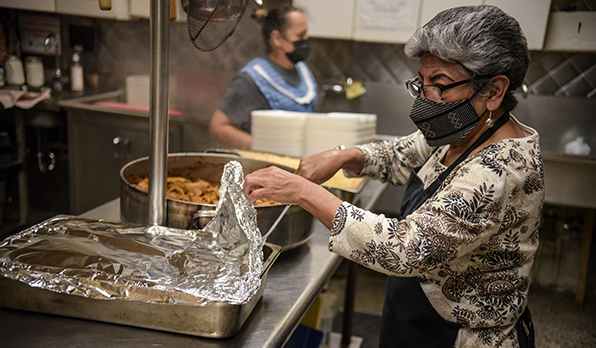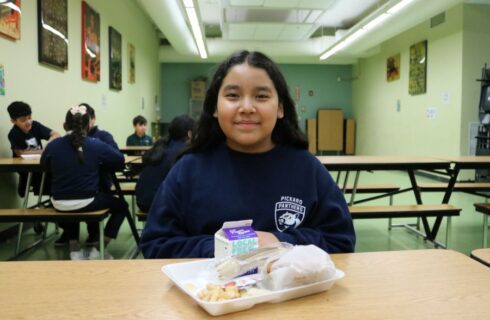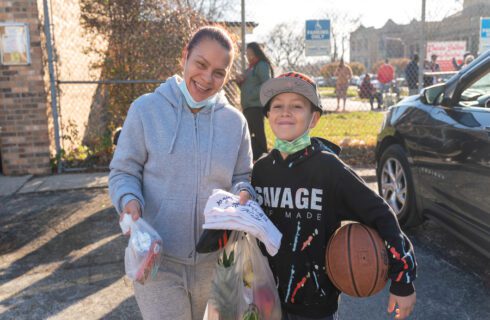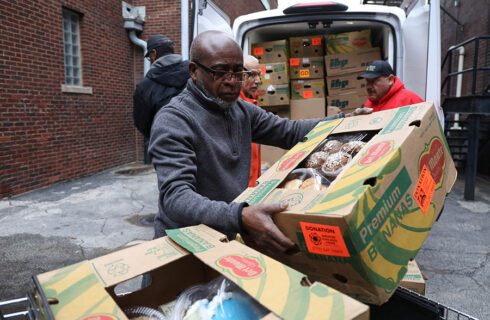On a recent Friday morning in Pilsen, Socorro Zapata stirred arroz y frijoles on a stovetop in the kitchen at the St. Pius Catholic Church. She and her fellow volunteers bustled around the tight quarters preparing a hot meal that would later serve about 40 people, primarily men who are either homeless or in between homes.
The smell of fresh tamales, Mexican-style rice and pot of beans wafted through the air in this church basement, which is also shared with the St. Pius Elementary School cafeteria.
"The day after I arrived, the first person I met was the parish priest,” Zapata said, recalling her first impression of the place some three decades ago. At the time, she would see about 80 people come through the soup kitchen.
Zapata, 56, is a native of Mexico City but she’s called Chicago home for nearly 30 years. She’s spent most of that time serving the Pilsen community. Since 2006, she’s managed both the food pantry and the soup kitchen at St. Pius, one of the Food Depository’s longtime partners serving people in need. With the help of about four volunteers, Zapata has managed to continue serving people during the pandemic through a grab-and-go model.
Their hot meals – which include rice, beans and food that is occasionally donated from local Pilsen restaurants – provide a little taste of home for many of the Latino men that visit the soup kitchen.
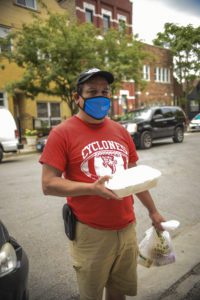
Roberto Sandoval with food from the St. Pius community soup kitchen.
“Colleagues brought me here,” said Roberto Sandoval, 53, when asked how he heard about the hot meals.
For Sandoval, father of five, the hot meals are much needed. He recently moved to Chicago from Cincinnati and he’s currently living with three other men, all looking for work in construction. Their current living situation does now allow them a kitchen.
Sandoval also sometimes gets his meals from the food given out at “La Aguila,” he said, referring to a nearby plaza in Pilsen.
At the center of Tenochtitlan Plaza is a statue of an eagle, known as La Aguila, which has become a landmark for many immigrants in Chicago who are looking for work. When the weather permits, local businesses and nonprofits sometimes provide meals there for people in need.
Back in 1963, St. Pius became the first church in the neighborhood to offer Mass in Spanish.
St. Pius continues to serve a high population of native Spanish speakers. Though Pilsen is a rapidly gentrifying neighborhood, about one-third of the people who live there are at risk of food insecurity, according to a Food Depository analysis.
Ruben Frias, 60, has a long family history of giving back. His mother, Beatriz Frias, helped run a pantry a few years back. He now visits St. Pius for hot meals three times a week.
Recently, Frias started receiving disability benefits because of a leg injury, he said, so he’s been unable to work for more than a year.
“The food that they make, they make it like gourmet!” Frias said, with smiling eyes. “That’s what makes it taste good!”
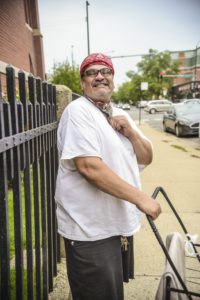
Ruben Frías after picking up his meal for the day.
Every week, Mario Alberto Luna, 74, makes a two-hour commute via public transportation just to give back. He started volunteering at St. Pius’s soup kitchen a little over five years ago.
After working for 20 years at a local manufacturing company, the now-retired father of five, and grandfather, found volunteering to help the community to be his passion.
“Ms. Socorro treated me very well,” Luna said. “And I make friends with all of them here.”
In addition to support from the Food Depository, St. Pius gets food from local restaurants and other grocery store donations. The mighty team of four volunteers has been committed to running the soup kitchen, amidst a global pandemic. They share one thing in common: They believe in providing food and hope to those in need.
This September, Zapata, the coordinator at St. Pius, traveled to Mexico City to visit her family in for the first time in nearly 30 years. The youngest of 12 siblings, she’s longed to make this trip for many years and to see her brothers and sisters. When speaking of it, she was overwhelmed with emotion.
“Ya contando los días. ¡Voy por veinte días!”
Already counting the days. I'm going for twenty days!
After providing nourishment every day for those in need, Zapata will be back in her homeland sharing laughter and stories of the home she has created in the Pilsen neighborhood of Chicago.
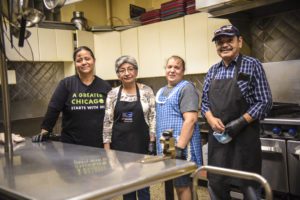
Volunteers from the St. Pius. From left to right Socorro Zapata, Gloria Flores, Andrea Campos and Mario Alberto Luna
Share This Post

